Text
if you have a chinese character and you don’t understand our naming traditions, do not give them a chinese name. you cannot just slap on a name that “sounds right” or the name of a famous person (that’s actually bad luck) onto them. that’s not how our names work and if you operate like that you’re being lazy and culturally insensitive. if you’re writing a contemporary story, just give them a western name and use their last name to indicate their ethnic background. (you can use a chinese celebrity’s western name as inspiration though.)
explanation time:
chinese names work in very different ways and it’s dependent on what your parents want for your future, what day and time you were born, the chinese characters (and the amount of strokes in them), your last name, and your family. there are actual services to give your child a name that will denote a happy, healthy, and fortunate life that takes all of that into consideration. in many families, there are actual meetings on what to name a child. this doesn’t even consider the language you speak and where you live/which province you come from (dear god if you give a person from a cantonese speaking region/lineage a mandarin name i will choose violence when reading your work). if you do not understand the language, if you do not understand the traditions, if you do not do your research, you will just look like the court jester about to get his head lopped off. please just do not even attempt giving your chinese character a chinese name if you’re not willing to do the work. if you’re really insistent about giving your characters a chinese name, you can support the community by actually paying someone to help you give your characters names. you can look them up and research people in your area.
12K notes
·
View notes
Text
Now YouTube has a habit of recommending me the weirdest stuff recently, but today i got this on my recommendations
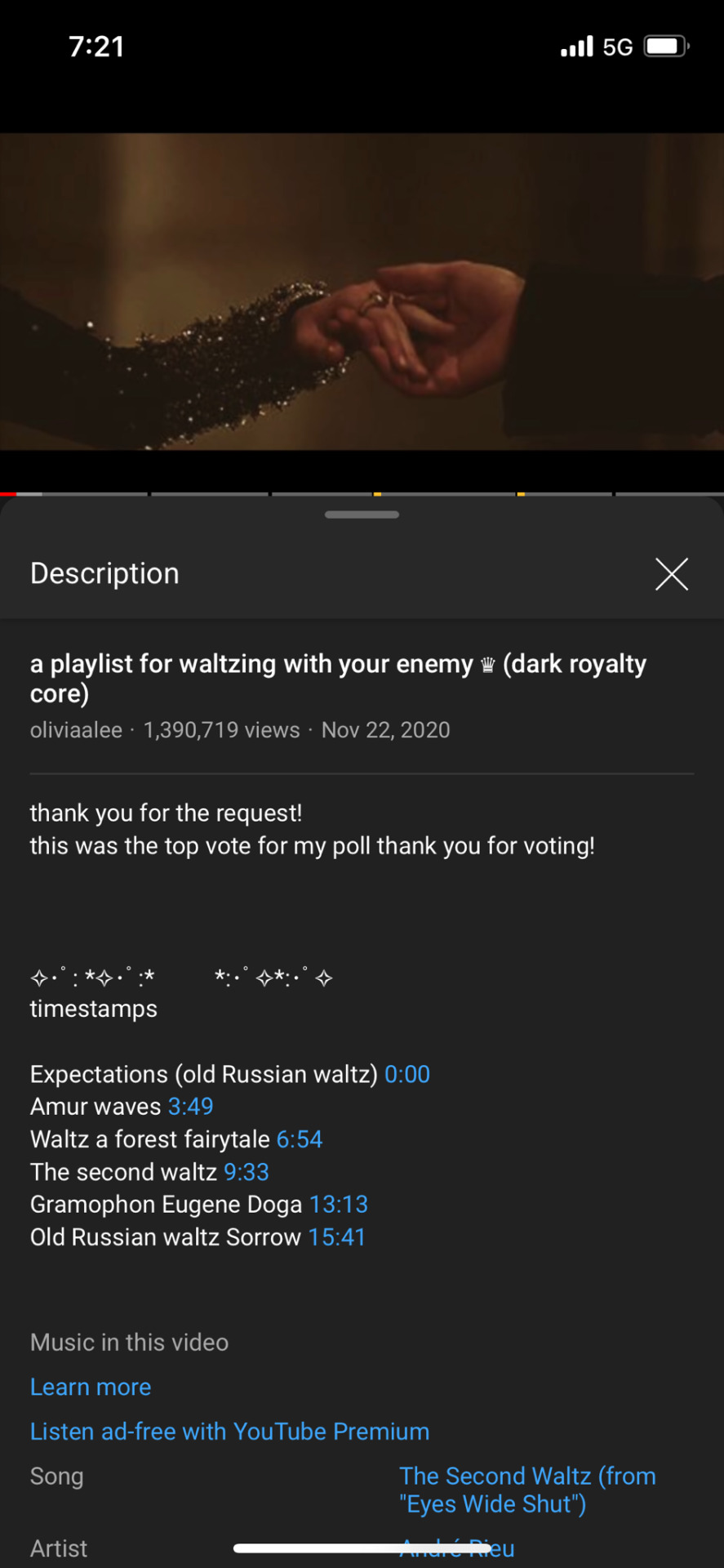
And about halfway through listening to this, I went and read the comments, literally I could not stop reading I was there for hours, here are some of my favorites
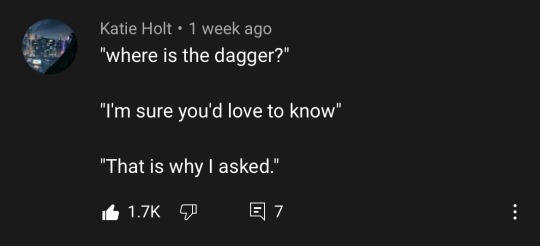
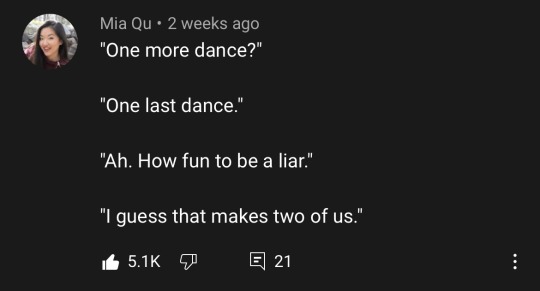
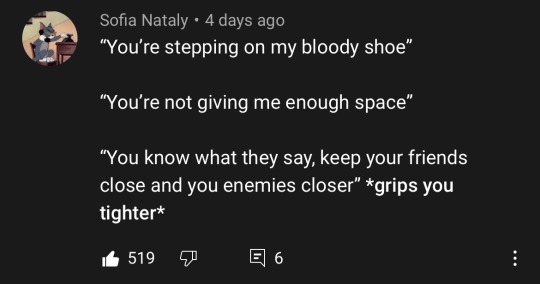
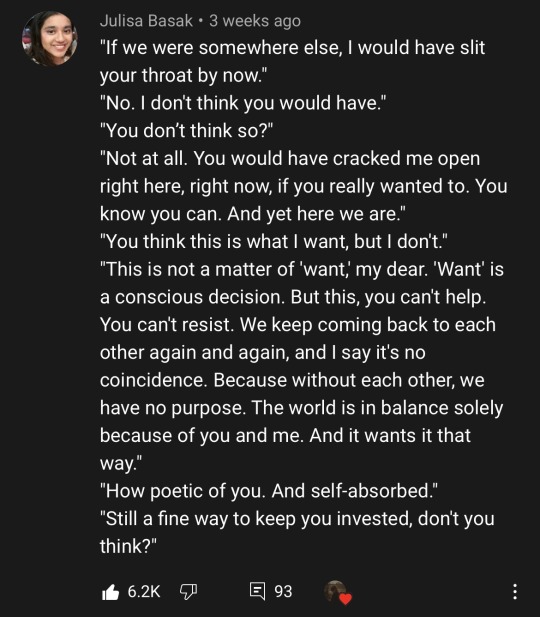
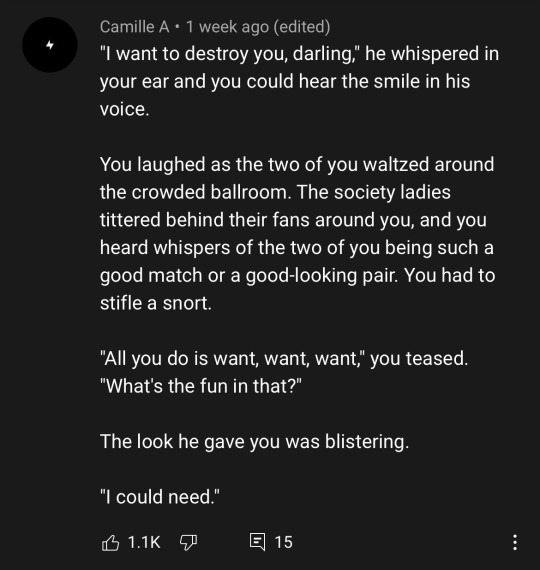

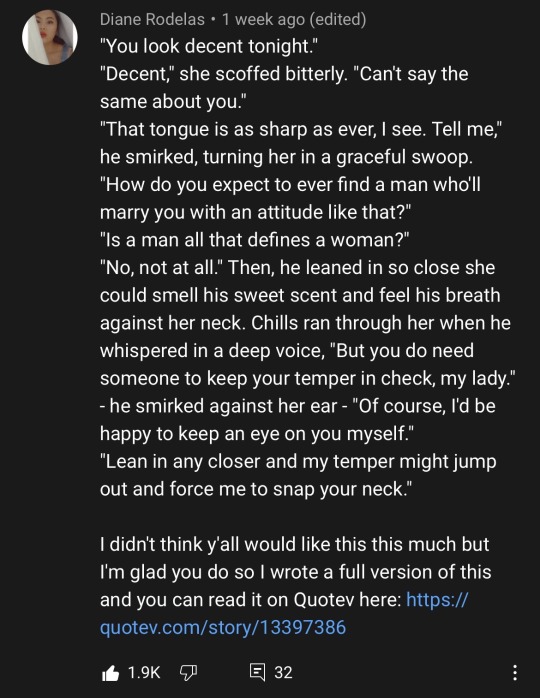
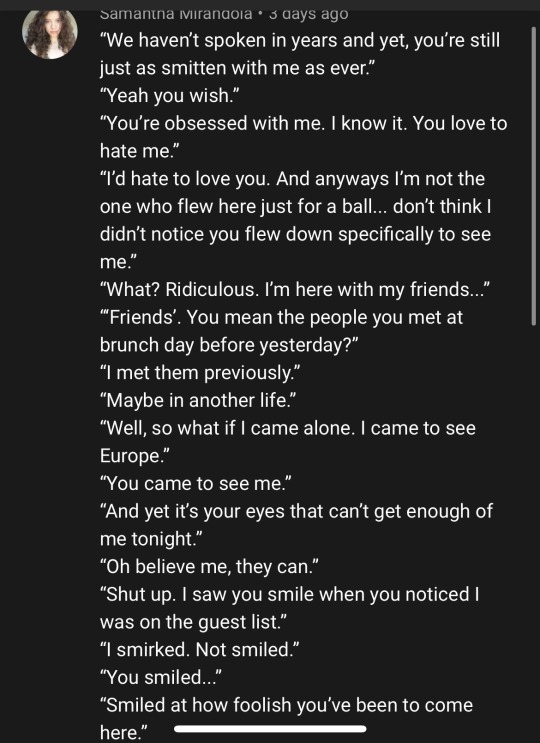
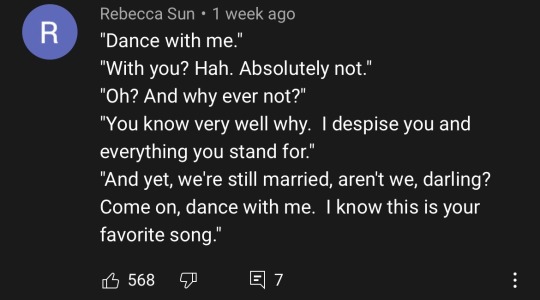
91K notes
·
View notes
Photo
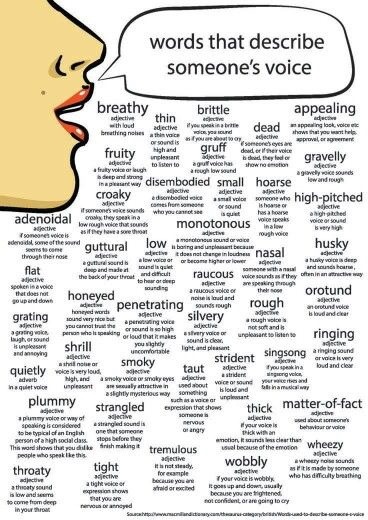
Thank you to whoever made this :) I felt like posting some writing tips.
17K notes
·
View notes
Text
how to properly structure a query letter!*
Dear [Agent],
[An optional brief introduction, no longer than 2 - 3 sentences, perhaps where you elaborate on the #ownvoices of your manuscript, or pointing out certain things in your manuscript that the agent asks for. I reiterate that this paragraph is optional. Unless you have a very specific reason to be querying this agent—for instance, if they tweeted an MSWL for a heist novel and you’re querying a heist novel—there is no relevance, so don’t include this paragraph.]
[The first paragraph of your summary introduces the world, the main character, and their Normal. For instance, Cynthia lives in the times of a pandemic and works to continue living in their new normal. Every day, Cynthia chooses to get up and keep living and making the most of their situation while trying to find something to do to be useful.]
[The second paragraph of your summary introduces the plot. To continue with the above idea, Cynthia has been tasked with trying to find a cure to coronavirus, but all they have to work with in their home is duct tape, tangerines, Tylenol, and a never-give-up attitude.]
[The third paragraph introduces stakes, aka what will happen if Cynthia doesn’t discover a cure with the resources they have at home. Luckily for them, however, a woman named Jane they had a one night stand with needs a place to crash after she was evicted. Cynthia agrees to let her stay as their roommate, especially because Jane brings with her the missing ingredient to the cure for coronavirus, a magic bean she stole from a giant–but there’s only one magic bean. If Cynthia and Jane can’t find a way to make more beans, they might be sent to the realm of giants forever.]
[The closing paragraph goes like this: Complete at 89,000 words, THE MAGIC BEAN is an Adult contemporary fantasy with potential for a companion novel. I believe it will appeal to fans of Erin Morgenstern and Naomi Novik. Briefly explain who you are and share what you’re comfortable with about yourself—I say I’m 26, headed to grad school for archiving, and that the book is #ownvoices for genderqueer representation. Also mention if you have any connection to the publishing industry. I mention who I was previously represented by, why we amicably parted ways, and that I’ve mentored in many writing contests.]
[Final closure: Thank you for your time and consideration. I look forward to hearing from you!]
[Best,]
[My name]
[My phone number and, though optional, my twitter handle]
*i’ve been in the publishing industry for nine years now, have mentored many authors who went on to be published by the Big 5, and worked in writing contests to help writers, not only with their manuscript, but with their pitch and query letter and comps etc. i know what i’m about 😉
6K notes
·
View notes
Text
how to properly structure a query letter!*
Dear [Agent],
[An optional brief introduction, no longer than 2 - 3 sentences, perhaps where you elaborate on the #ownvoices of your manuscript, or pointing out certain things in your manuscript that the agent asks for. I reiterate that this paragraph is optional. Unless you have a very specific reason to be querying this agent—for instance, if they tweeted an MSWL for a heist novel and you’re querying a heist novel—there is no relevance, so don’t include this paragraph.]
[The first paragraph of your summary introduces the world, the main character, and their Normal. For instance, Cynthia lives in the times of a pandemic and works to continue living in their new normal. Every day, Cynthia choose to get up and keep living and making the most of their situation while trying to find something to do to be useful.]
[The second paragraph of your summary introduces the plot. To continue with the above idea, Cynthia has been tasked with trying to find a cure to coronavirus, but all they have to work with in their home is duct tape, tangerines, Tylenol, and a never-give-up attitude.]
[The third paragraph introduces stakes, aka what will happen if Cynthia doesn’t discover a cure with the resources they have at home. Luckily for them, however, a woman named Jane they had a one night stand with needs a place to crash after she was evicted. Cynthia agrees to let her stay as their roommate, especially because Jane brings with her the missing ingredient to the cure for coronavirus, a magic bean she stole from a giant–but there’s only one magic bean. If Cynthia and Jane can’t find a way to make more beans, they might be sent to the realm of giants forever.]
[The closing paragraph goes like this: Complete at 89,000 words, THE MAGIC BEAN is an Adult contemporary fantasy with potential for a companion novel. I believe it will appeal to fans of Erin Morgenstern and Naomi Novik. Briefly explain who you are and share what you’re comfortable with about yourself—I say I’m 26, headed to grad school for archiving, and that the book is #ownvoices for genderqueer representation. Also mention if you have any connection to the publishing industry. I mention who I was previously represented by, why we amicably parted ways, and that I’ve mentored in many writing contests.]
[Final closure: Thank you for your time and consideration. I look forward to hearing from you again!]
[Best,]
[My name]
[My phone number and, though optional, my twitter handle]
*i’ve been in the publishing industry for nine years now, have mentored many authors who went on to be published by the Big 5, and worked in writing contests to help writers, not only with their manuscript, but with their pitch and query letter and comps etc. i know what i’m about 😉
6K notes
·
View notes
Text
some fucking resources for all ur writing fuckin needs
* body language masterlist
* a translator that doesn’t eat ass like google translate does
* a reverse dictionary for when ur brain freezes
* 550 words to say instead of fuckin said
* 638 character traits for when ur brain freezes again
* some more body language help
(hope this helps some ppl)
187K notes
·
View notes
Photo


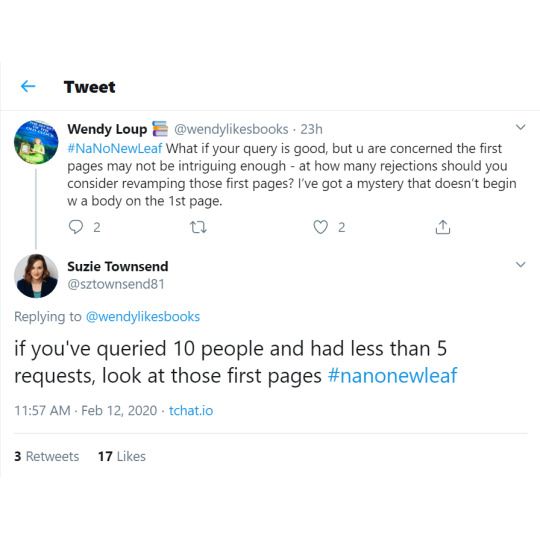

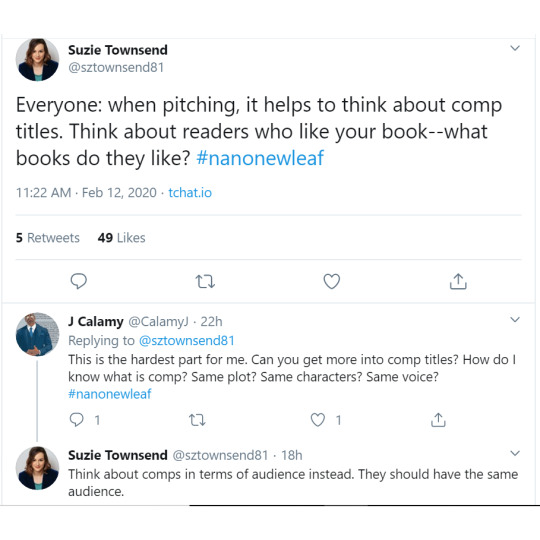
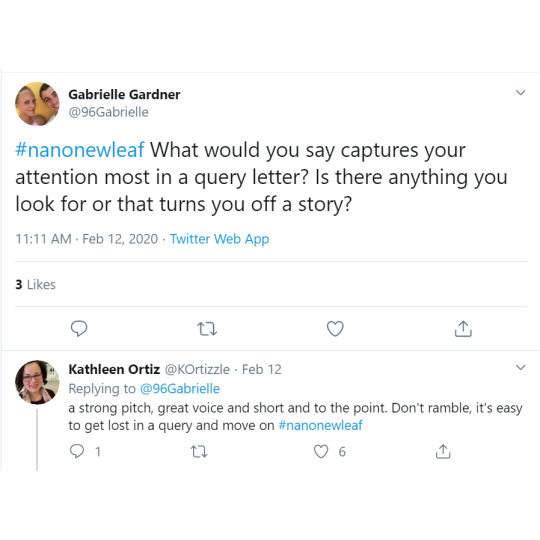

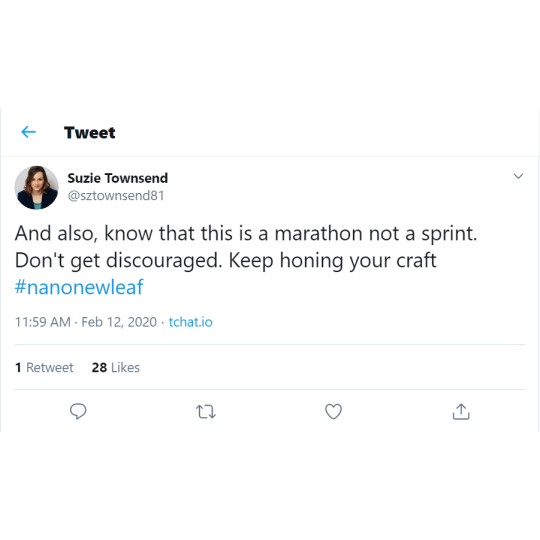
We had a great tweet chat on our Twitter account last week with fantastic advice for people who want to pitch and publish their novel.
Agents Suzie Townsend and Kathleen Ortiz from New Leaf Literary were gracious enough to field questions from eager writers! Do you have any publishing questions or advice?
Keep reading
677 notes
·
View notes
Text
searching for a literary agent with cog
after the big long post i made about narrowing down my “maybe list” of agents, i got some interest in how exactly i go about that (and how i go about building a list of potential agents in the first place)
first thing’s first
where should you start
the main tool i’m going to show you how to use is querytracker.net (i’ve said it 50 times and i’ll say it again: if you’re querying premium is more than worth it).
there are a handful of different places you can source agents. here’s a few …
querytracker.net - a comprehensive tool for finding agents/publishers and tracking queries and submission
duotrope.com - same features but i found it less valuable
mswishlist.com - a compiled list of agents’ twitter #MSWL requests
manuscriptwishlist.com - a big database of agents and the “profiles” they’ve built to let you know exactly what they’re interested in
publishersmarketplace.com - roughly the same thing, for our purposes
aaronline.org - database of agents belonging to association of authors’ representatives with their interests
duotrope is the only site that requires a subscription, and querytracker is the only one that offers extended features with a subscription.
so let’s get started
Keep reading
155 notes
·
View notes
Text
Writing Advice Posts: A Handy Reference Guide
(Updated 12/25/20) Hey all, I’ve got quite a few writing advice posts & answered Asks on my blog at this point, so I’m making this reference guide to make it easier to find what you’re looking for. Hope it helps!
Free Downloads
Get access to my free Fiction Writing Toolkit on my website.
Free Writing Advice Emails
Join my email list and get free writing advice emails sent straight to your inbox. You’ll also get early notification of any discounts or giveaways, and direct access to me to ask questions about writing. It’s totally free and you can unsubscribe anytime!
General
8 Ways to Improve Your Writing
10 Best Books About Writing Fiction
How to Spot Bad Writing Advice: 6 Red Flags to Look For
“Show Don’t Tell”? Not Always. Here’s When to Use Summary
How to start a story
More about starting stories
The first sentence
Weak words
Why Just About Every Published Book in the World Does 57 Things That Just About Every Book About Writing Tells You Not to Do
Creative Nonfiction Cliches to Avoid
How to Read Like a Writer
How to Write During a Pandemic
The Writing Process, Writer’s Block, & Inspiration
To all the Writers Suffering from Depression
How to Train Yourself to Write Faster
Just a friendly reminder that creativity is difficult to quantify.
Quick Writing Tip: Make a Note to Your Future Self in Your WIP
Quick Writing Tip: Take Notes!
Just a friendly reminder that writing is not always a linear process.
Quick Cure for Writer’s Block: Lower Your Expectations
Set Realistic Goals
Your Skills May Need Time to Catch Up to Your Vision
It’s Okay to Experiment and Be Weird As Fuck
Surround Yourself With Supporters
It’s okay to take a break.
Your First Draft is Raw Material
Getting into ��The Zone”
Vomit Brain
Writing from Your Imagination vs. Reality
Dealing with Criticism
Getting Bored with Your Own Writing
Getting past a block
Doing research on topics you don’t have first-hand experience with
Journalling about your writing
How to Keep Yourself From Editing As You Write
Advice for Getting Over a Writing Slump
Dealing with Procrastination
How to Write Like You Used to, Before You Learned Stuff that Fucked Up Your Natural Creative Flow and Turned Your Writing into Boring, Stilted Garbage
Concept: Maybe Your First Draft DOESN’T Suck
How to Deal with Post-Writing Depression
Character Development
Creating Character Arcs with the DCAST Method
What Does Your Main Character Want?
How to Activate Your Passive Characters, One Verb at a Time
How to Use Description to Show Character Development
How to Create a Non-Cliched First-Meeting Scene
The “It Depends” Post
Shifting internal goals
When to identify your character’s goal
Writing about normal people with normal problems
If you’re worried about your character being too similar to someone else’s character
Describing your characters without messing up your pacing
Story, Plot, & Pacing
Quick Plotting Tip: Write Your Story Backwards
Pause at the Threshold
How to Spot an “Info-dump”
Slowing Down the Pace of Your Story Without Boring Your Reader
Time Transitions
How to Create a Non-Cliched First-Meeting Scene
Creating Conflict
When & how to cut a scene
If you’re good at creating characters but awful at creating plot
When you’ve plotted your story but can’t get started
En Media Res
Writing to Your Ideal Reader
Deus Ex Machina
Foreshadowing
Finding an Ending
What to write between moments of conflict
Starting a story with waking-up scene
How to Know When You’re Done Outlining
Doing a Structural Overhaul on Your Story
How to Find an Ending from a Beginning
Editing Tip: How to Speed Up or Slow Down Your Pacing
Description, Setting, & Worldbuilding
How to Make Your Descriptions Less Boring
How to Spot an “Info-dump”
Adding Descriptions to Intense Scenes Without Messing Up Your Story’s Flow
How to Use Description to Show Character Development
Worldbuilding: How much is too much?
Modeling your fantasy world from stuff in the real world
Internal Consistency
Utilizing Sound
How to Do World-Building Research
Point of View
How to Choose the Right Point of View for Your Story
A Beginner’s Guide to Multiple Point of View
6 Questions to Ask About Your Point of View
How to decide if you should use first person or third person
More point of view basics
Head hopping
How to Head Hop without Head Hopping
What to Do When You’re Halfway Through Your Story and Realize Your POV Isn’t Working
3 Tips to Avoid Overusing “I” in a First Person Story
Dialogue
How to Improve Your Dialogue
3 Ways to Make Your Dialogue More Interesting
Starting a story with dialogue
Are You Using Too Much Stage Direction?
Which is Better: Exposition or Expository Dialogue?
Publishing & Sharing Your Work
7 Tips to Build an Audience for Your Writing
Pros and Cons of Self Publishing
Quick Publishing Tip: Don’t Bury Your Gold
How to Properly Format Your Manuscript for Publication
A warning about posting writing online that you intend to publish later
Advice for writers who are worried about people stealing their work or ideas
Getting feedback on your writing
How to Create a Cover Letter for a Literary Magazine or Journal
How to Make a 3D Mockup of Your Book for Free
Editing
10 Questions to Ask an Editor Before Hiring Them
Quick Revision Tip: Read Your Writing Out Loud
How to Keep Yourself From Editing As You Write
Cut the fidgeting
Are you suffering from -ing disease?
Are you Using Too Much Stage Direction?
What “Editing” Really Means
Quick Editing Tip: “That”
Quick Revision Tip: Read Faster
Editing Tip: Dialogue
Tips for Editing a Story
Should You Use a Contract When Hiring an Editor?
Quick Tip: Up & Down
Pre-Editing Checklist
Miscellaneous
The Difference Between a Semi-Colon and an Em-Dash
…if you find any broken links please let me know and I will fix them! xo
//////////////
The Literary Architect is a writing advice blog run by me, Bucket Siler. For more writing help, get my FREE Fiction Writing Toolkit or The Complete Guide to Self-Editing for Fiction Writers. xoxo
14K notes
·
View notes
Photo
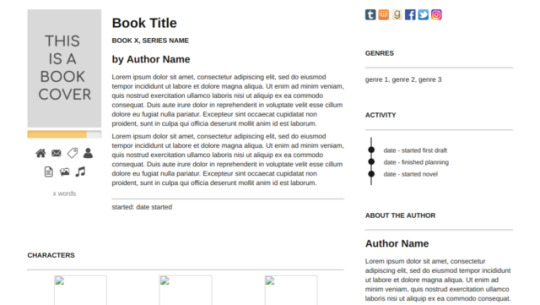
Goodreads WIP Page Theme | preview | code
This is so detailed that I’m pretty sure it’s over the top… Have fun!
page features…
quick guide to html / css for personalisation (guides in the code for more specific stuff)
book cover, description, genres
progress bar
links to other relevant pages & social media links
activity timeline (book started, draft started, draft finished…)
about the author
characters (with icons and descriptions)
worldbuilding &faq
other wips (sliding menu of book covers with links to wip pages)
quotes & trivia
guide to adding more sections!
1K notes
·
View notes
Text
gentiles have no idea which Jewish holidays are particularly significant relative to other Jewish holidays
106K notes
·
View notes
Text
How To Name Your Chinese Characters:
1) LAST NAMES:
I’ve pasted the Top 100 common last names in alphabetical order, and bolded the ones that appear in CQL:
B: 白 Bai
C: 蔡 Cai ; 曹 Cao ; 常 Chang ; 曾 Ceng ; 陈 Chen ; 程 Cheng ; 崔 Cui ;
D: 戴 Dai ; 邓 Deng ; 丁 Ding ; 董 Dong ; 杜 Du ;
F: 范 Fan ; 方 Fang ; 冯 Feng ; 付 Fu ;
G: 高 Gao ; 葛 Ge ; 龚 Gong ; 顾 Gu ; 郭 Guo ;
H: 韩 Han ; 何 He ; 贺 He 洪 Hong ; 侯 Hou ; 黄 Hua ; 胡 Hu ;
J: 贾 Jia ; 蒋 Jiang ; 姜 Jiang ; 江 Jiang ; 金 Jin ;
K: 康 Kang ;
L: 赖 Lai ; 李 Li ; 黎 Li ; 廖 Liao ; 梁 Liang ; 林 Lin ; 刘 Liu ; 陆 Lu ; 卢 Lu ; 路 Lu ; 吕 Lü ; 罗 Luo ;
M: 马 Ma ; 麦 Mai ; 毛 Mao ; 孟 Meng ;
N: 倪 Ni ; 牛 Niu ;
P: 潘 Pan ; 彭 Peng ;
Q: 钱 Qian ; 秦 Qin ; 邱 Qiu ;
R:任 Ren ;
S: 邵 Shao ; 沈 Sheng ; 史 Shi ; 石 Shi ; 施 Shi ; 宋 Song ; 苏 Su ; 孙 Sun ;
T: 陶 Tao ; 谭 Tan ; 唐 Tang ; 田 Tian ;
W: 万 Wan ; 王 Wang ; 汪 Wang ; 魏 Wei ; 吴 Wu ;
X: 邢 Xing ; 夏 Xia ; 蕭 Xiao ; 谢 Xie ; 徐 Xu ; 许 Xu ; 薛 Xue ;
Y: 阎 Yan ; 严 Yan ; 杨 Yang ; 姚 Yao ; 叶 Ye ; 余 Yu ; 于 Yu ; 袁 Yuan ;
Z: 张 Zhang ; 赵 Zhao ; 郑 Zheng ; 钟 Zhong ; 周 Zhou ; 朱 Zhu ; 庄 Zhuang ; 邹 Zou ;
Above are all single character last names, but there are some double character Chinese last names, seen below (list not exhaustive):
独孤 Du’Gu ;
公孙 Gong’Sun ;
南宫 Nan’Gong
欧阳 Ou’Yang ;
司马 Si’Ma ; 上官 Shang’Guan ;
宇文 Yu’Wen ;
长孙 Zhang’Sun ; 诸葛 Zhu’GE ;
2) GIVEN NAMES/COURTESY NAMES
《Elements》:
Light*: 光 (guāng) - light, 亮 liàng - bright / shine, 明 (míng) - bright, ��� (xī) - early dawn, 昀 (yún) - daylight, 昭 (zhāo) - light, clear,照 (zhào) - to shine upon,
Fire: 焰 (yàn) - flames, 烟 (yān) - smoke,炎 (yán) - heat/burn, 烨 (yè) - dazzling light,
Water: also see “weather” OR “bodies of water” under nature; note the words below while are related to water have meanings that mean some kind of virtue: 清 (qīng) - clarity / purity, 澄 (chéng) - clarity/quiet, 澈 (chè) - clear/penetrating, 涟 (lián) - ripple, 漪 (yī) - ripple, 泓 (hóng) - vast water, 湛 (zhàn) - clear/crystal, 露 (lù) - dew, 泠 (líng) - cool, cold, 涛 (tāo) - big wave,泽 (zé),浩 hào - grand/vast (water),涵 (han) - deep submergence / tolerance / educated
Weather: 雨 (yǔ) - rain, 霖 (lín) - downpouring rain, 冰 (bīng) - ice, 雪 (xuě) - snow, 霜 (shuāng) - frost
Wind: 风 (fēng) - wind
* some “Light” words overlap in meaning with words that mean “sun/day”
《Nature》:
Season: 春 (chūn) - spring, 夏 (xià) - summer, 秋 (qíu) - aumtum, 冬 (dōng) - winter
Time of Day: 朝 (zhāo) - early morning / toward, 晨 (chén) - morning / dawn, 晓 (xiǎo) - morning, 旭 (xù) - dawn/rising sun,昼 (zhòu) - day,皖 (wǎn) - late evening,夜 (yè) - night
Star/Sky/Space: 云 (yún) - cloud,天 (tiān) - sky/ heaven,霞 (xiá) - afterglow of a rising or setting sun,月 (yuè) - moon,日 (ri) - day / sun,阳 (yáng) - sun,宇 (yǔ) - space,星 (xīng) - star
Birds: 燕 (yàn) - sparrow, 雁 (yàn) - loon, 莺 (yīng) - oriole, 鸢 (yuān) - kite bird (family Accipitridae),羽 (yǔ) - feather
Creatures: 龙 (lóng) - dragon/imperial
Plants/Flowers:* 兰 (lán) - orchids, 竹 (zhú) - bamboo, 筠 (yún) - tough exterior of bamboos, 萱 (xuān) - day-lily, 松 (sōng) - pine, 叶 (yè) - leaf, 枫 (fēng) - maple, 柏 bó/bǎi - cedar/cypress, 梅 (méi) - plum, 丹 (dān) - peony
Mountains: 山 (shān), 峰 (fēng) - summit, 峥 (zhēng),
Bodies of water: 江 (jiāng) - large river/straits, 河 (hé) - river, 湖 (hú) - lake, 海 (hǎi) - sea�� 溪 (xī) - stream, 池 (chí) - pond, 潭 (tán) - larger pond, 洋 (yáng) - ocean
* I didn’t include a lot of flower names because it’s very easy to name a character with flowers that heavily implies she’s a prostitute.
《Virtues》:
Astuteness: 睿 ruì - astute / foresight, 智 (zhi), 慧 (hui), 哲 (zhé) - wise/philosophy,
Educated: 博 (bó) - extensively educated, 墨 (mo) - ink, 诗 (shi) - poetry / literature, 文 (wén) - language / gentle / literary, 学 (xue) - study, 彦 (yàn) - accomplished / knowledgeable, 知 (zhi) - to know, 斌 (bīn) - refined, 赋 (fù) - to be endowed with knowledge
Loyalty: 忠 (zhōng) - loyal, 真 (zhēn) - true
Bravery: 勇 (yǒng) - brave, 杰 (jié) - outstanding, hero
Determination/Perseverance: 毅 (yì) - resolute / brave, 恒 (héng) - everlasting, 衡 (héng) - across, to judge/evaluate,成 (chéng) - to succeed, 志 (zhì) - aspiration / the will
Goodness/Kindness: 嘉 (jiā) - excellent / auspicious,磊 (lěi) - rock / open & honest, 正 (zhèng) - straight / upright / principle,
Elegance: 雅 (yǎ) - elegant, 庄 (zhuāng) - respectful/formal/solemn, 彬 (bīn) - refined / polite,
Handsome: 俊 jùn - handsome/talented
Peace: 宁 (níng) - quietness/to pacify, 安 (ān) - peace, safety
Grandness/Excellence:宏 (hóng) - grand,豪 (háo) - grand, heroic,昊 (hào) - limitless / the vast sky,华 (huá) - magnificent, 赫 (hè) - red/famous/great, 隆 (lóng) - magnificent, 伟 (wěi) - greatness / large,轩 (xuān) - pavilion with a view/high,卓 (zhuó) - outstanding
Female Descriptor/Virtues/Beauty: 婉 (wǎn),惠 (huì), 妮 (nī), 娇 (jiāo), 娥 (é), 婵 (chán) (I didn’t include specific translations for these because they’re all adjectives for women meaning beauty or virtue)
《Descriptors》:
Adverbs: 如 (rú) - as,若 (ruò) - as, alike,宛 (wǎn) - like / as though,
Verbs: 飞 (fēi) - to fly, 顾 (gù) - to think/consider, 怀 (huái) - to miss, to possess, 落(luò) - to fall, to leave behind,梦 (mèng) - to dream, 思 (sī) - to consider / to miss (someone),忆 (yì) - memory, 希 (xī) - yearn / admire
Colours: 红 (hóng) - red, 赤 (chì) - crimson, 黄 (huàng) - yellow, 碧 (bì) - green,青(qīng) - azure,蓝 (lán) - blue, 紫 (zǐ) - violet ,玄 (xuán) - black, 白 (baí) - white
Number:一 (yī), 二 (er) - two, 三 (san) - three, 四 (si) - four, 五 (wu) - five, 六 (liu) - six, 七(qi) - seven, 八 (ba) - eight, 九 (jiu) - nine, 十 (shi) - ten
Direction: 东 (dōng) - east, 西 (xi) - west, 南 (nan) - south, 北 (bei) - north,
Other: 子 (zǐ) - child, 然 (rán) - correct / thusly
《Jade》: *there are SO MANY words that generally mean some kind of jade, bc when ppl put jade in their children’s name they don’t literally mean the rock, it’s used to symbolize purity, goodness, kindness, beauty, virtue etc*
琛 (chen), 瑶 (yao), 玥 (yue), 琪 (qi), 琳 (lin)
《Spirituality》
凡 (fan) - mortality
色 (se) - colour, beauty. In buddhism, “se” symbolizes everything secular
了 (liao) - finished, done, letting go
尘 (chen) - dust, I’m not… versed in buddhism enough to explain “chen”, it’s similar to “se”
悟 (wu) - knowing? Cognition? To understand a higher meaning
无 (wu) - nothing, the void, also part of like “letting go”
戒 (jie) - to “quit”, but not in a bad way. In buddhism, monks are supposed to “quit” their earthly desires.
极 (ji) - greatness, also related to the state of nirvana (? I think?)
11K notes
·
View notes
Text
Fiction Writing Advice Posts
Hey all, Some of you know that in addition to this Tumblr blog I also keep a blog on my website. A lot of the posts overlap, but not all of them, so I’ve made this list for your reading pleasure:
How to Control Your Pacing
How to Write During a Pandemic
How to Read Like a Writer
What if Your First Draft DOESN’T Suck?
How to Do World-Building Research
How to Properly Format a Manuscript for Submission
10 Questions to Ask an Editor Before Hiring Them
Creating Character Arcs with the DCAST Method
How to Choose the Right Point of View for Your Story
A Beginner’s Guide to Multiple Point of View
Show Don’t Tell? Not Always. Here’s When to Use Summary
8 Ways to Improve Your Fiction Writing
How to Spot Bad Writing Advice: 6 Red Flags to Look For
5 Reasons to Kill Your Critique Group
Are You Using Too Much Stage Direction?
Why Nobody Cares About Your Plot
How to Use Adverbs Like a Pro
How to Activate Your Passive Characters, One Verb at a Time
3 Easy Ways to Transform Boring Descriptions
3 Ways to Increase Conflict in Your Dialogue
A Step-by-Step Guide to Getting Killer Feedback from Beta Readers
How to Know What Kind of Editing You Need
10 Best Books About Fiction Writing
xoxo
10K notes
·
View notes
Text
How to Format Your Finished Manuscript
as written by a perpetually flabbergasted editor
Congratulations, you’ve finished a manuscript! That monumental achievement alone deserves a reward. Please get yourself something delicious—don’t worry, I can wait.
Back? Awesome, because it’s time to talk about an important step of the prepublishing and/or pre-editing process, and that is how to format your manuscript.
When you’re writing your manuscript, it’s likely you have a unique setup. Fancy fonts, different text and document background colors, your preferred way of formatting the document—all elements work together to create a comfortable writing space where you can be your most creative.
As both a writer and editor, I have no problems with writers going wild with their documents’ technical aspects while they’re drafting—I do exactly the same thing when drafting. But when it comes time to share your project with other people—especially professionals in the publishing world—your snazzy setup is no longer going to be a benefit. I could share horror stories relating to document setup, from thousands of spaces used instead of the tab key to wacky file conversion issues.
Please don’t make your editor’s job any harder than it needs to be. Fancy formatting looks great, but it can be a nightmare to undo and wastes time that your editor could otherwise spend polishing the words themselves rather than what’s around them. It’s also significantly easier to work with a document that adheres to a standard format because it’s easier to catch mistakes that way—the editor isn’t distracted trying to wrangle extra spaces and text appearing in other languages.
Most publishing houses have what are called submission guidelines. Read them. Follow them. There’s little chance your manuscript is exempt from the rules, and believe me when I say authors who flaunt the guidelines don’t win the respect of the people who are working on their manuscripts.
If the publisher/editing service you’re submitting to doesn’t have obvious guidelines, first ask about them. They might have preferences. If not, as follows are some basic standard practices in North American publishing.
First off, if you can’t bear to give up your fancy writing setup, create a new copy of your document specifically for editing/submitting. Clearly label it as such. Make sure you implement any changes to this for-editing/submitting document, not just your fancy original.
Page and text setup:
Remove any document background images/page colors.
Change the entire document’s font to Times New Roman point 12. Make it black. Not dark gray, not dark brown—black.
Set the margins to one inch on all sides. This is Microsoft Word’s default document format, but not enough submitted manuscripts use it. Remember: layout for publishing comes after editing, not before. Editors are liable to completely change your document’s pretty formatting to industry standards anyway.
Set the document’s orientation to portrait, not landscape.
Center all section and chapter titles (e.g., Table of Contents, Chapter 1, Acknowledgements, About the Author, etc.).
Remove all double spaces from the file. Seriously. This is an incredibly easy step. Do not make your overworked, underpaid editor do this incredibly trivial and time-consuming task for you. Especially if you are using double spaces to indent or center content. If you, for some reason, are using the space bar to indent or center content, please stop what you are doing and follow these steps:
Use your word processor’s “center text” function. In programs like Word, this can be done by hitting Control + E. (Ctrl + L and Ctrl + R, respectively, align text left and right.) Do not justify your text unless the guidelines demand it.
Use the tab key to indent paragraphs.
But bear in mind that sometimes this can result in a “tab” character existing at the beginning of a paragraph. This is bad. Preferably, set the entire document to a 0.5-inch indent and delete all tab characters.
Seriously, though, you should be searching every document before you send it out or copy it to an online format for double spaces. Make this a good habit, and you’ll ensure you set yourself apart as a cut above the other writers out there.
Set the entire document’s line spacing to double.
Front matter, chapters, and back matter should be separated by page breaks, not by a series of blank lines.
If you really want to delight your editor or anyone else who needs to work on your manuscript, consider removing all leading and trailing spaces from the document (link embedded).
Style elements:
Run spell check. This sounds obvious, but trust me, I’ve received manuscripts riddled with obvious spelling errors. If you write with spell check off for one reason or another, turn it back on when you’re getting ready to send a document out. Make a full pass on the document, and pay attention to every instance of that red squiggle.
Make sure you’re spelling the names of your characters and places consistently. I’ve seen Matt become Mike in the next paragraph, and Donilo become Donillo. Editors’ trust in the author’s abilities to do anything with competence drop drastically when we find these kinds of careless errors.
Similarly, either use the American spellings or the British spellings. Be consistent.
Separate your scenes with fleuron breaks. Three centered asterisks (***) used without spaces is the most common method of creating a fleuron break and the one I recommend using, although sometimes three number signs/hashes (###) can be acceptable. Do not use fancy symbols or symbols created through special fonts. They will not carry through if your editor changes your entire document to Times New Roman.
Optional change: remove the indent from the first paragraph in a chapter or after a scene break.
Make a point of using punctuation consistently. If you’re going to use the oxford comma, use it every time. Use a single dash consistently. Punctuate dialogue properly.
Improperly punctuated dialogue is one of the most common errors editors fix. There are only a few basic rules, covered here (link embedded), so please make an effort to learn and use them.
Use paragraphs properly. New speaker = new paragraph. New subject = new paragraph.
Once again, if you really want to delight your editor, change all hyphens between number ranges to en dashes. 3-5 days will become 3–5 days.
Correctly title your document. The title isn’t somehow going to magically change from StupidProject.docx or afhuowjfoa;wijef.docx to TheHungerGames.docx between your submitting it and other people reading the title.
If possible, use the .docx file format.
I want to wrap this up by saying that yes, editors are here to catch the mistakes you’ve missed, and we invariably have obscure technical knowledge that most writers don’t know exists (in Greek, the question mark is represented by a semicolon), but it’s your job as the writer to put your best effort forward. Also bear in mind that not all editors get paid to handle formatting issues but are expected to resolve them anyway. Fixing these basic issues yourself or, better yet, not creating them at all will help both you and your editor(s) ensure the version of the book you put out is the best possible version.
2K notes
·
View notes
Text
some quick querying tips ...
it's worth the $25/year subscription to QueryTracker.net
have a handful of "dear agent" query letters. choose the one you think will appeal most to the agent you're interested in and add some flavor for that specific agent
have 1) a finished manuscript 2) at least one solid (and customizeable!!) query letter 3) a synopsis 4) a one-sentence pitch 5) a book comp list 6) an author bio and 7) a "what do you expect from your agent" all on hand before querying. not every agent will ask for every item, but you'll definitely find yourself wanting at some point
save all your queries. label their contents (i have each agent in a separate folder with all materials submitted to them & relevant links)
more to come as i think of them, plus i'm planning a comprehensive post when this is all said & done
159 notes
·
View notes
Text
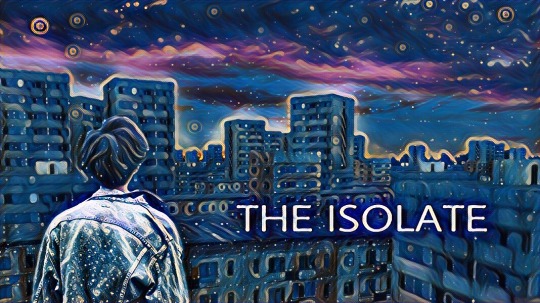
My entry for the Wip Blind Date writeblr event :)
THE ISOLATE CITY // OFFICIAL WIP INTRO
“Resigning herself to another sleepless night, Luna pulled her black jacket tightly around her and whispered the same words she whispered to herself every single night.
“I’m going to get out of here.”
CATEGORY: YA
GENRE: Sci-fi, dystopian future
TRIGGER WARNINGS: Extreme violence, physical abuse, sexual abuse
POV: Third person multiple
STATUS: Second draft of book 1 (plan is 3 books)
SYNOPSIS //
Twenty-five years ago, when the world was on the brink of collapse, the Isolate City was created. Prisons now a thing of the past, any crime from petty thievery to cold-blooded murder merits a life sentence inside the city. The Isolate City is a place for criminals and death. It is not a place for a child to grow up.
Luna Sharp was born inside the city and has no knowledge of what life is like outside of the prison walls. Every day is a battle for survival, but she is good at surviving. What she really wants is to escape.
But things are changing; shadows are moving into the light, and Luna discovers that she is not alone in guarding a terrible secret. The Isolate City is no longer as safe as Luna once thought. Breaking free of her chains is the only option.
But she is running out of time...
CHARACTERS:
Luna Sharp: our short-tempered protagonist with a loathing for intimacy and a passion for weaponry
Felix Joyce: well-mannered but often resorts to sarcasm due to unrequited love and a tragic backstory
Thalia Hunter: a woman who is incredibly talented at being dangerous but wishes she wasn’t
Stella Alvarez: a voice of reason with bright eyes and a bigger role in the story than Luna dares to imagine
Seth Castillo: a constant with good ideas; they would be lost without him
Toby Hope: comedic relief with a touch of a desperate desire for friendship
LINKS: The first three chapters of The Isolate City
An Pinterest Board
Fancasts and Cover Design by yours truly
And I think that’s everything! I can’t wait to see whose WIP I get :)
14 notes
·
View notes




